How Vigilant Journalists Are Stepping Up Their Game
Journal-isms Roundtable photos by Sharon Farmer/sfphotoworks
Homepage photo: New Yorker cover by Barry Blitt
Journal-isms will be on hiatus for the next couple of weeks.
[btnsx id=”5768″]

How Vigilant Journalists Are Stepping Up Their Game
“President Biden used his State of the Union address on Thursday to launch a series of fiery attacks against former President Donald Trump, a competitor whom he did not mention by name but made clear was a dire threat to American democracy and stability in the world,” Katie Rogers reported Thursday for the New York Times.
It is a threat hiding in plain sight, evidenced by Trump’s own words and those of his supporters.
It’s also one that many people don’t yet get, but about which some have been sounding an alarm.
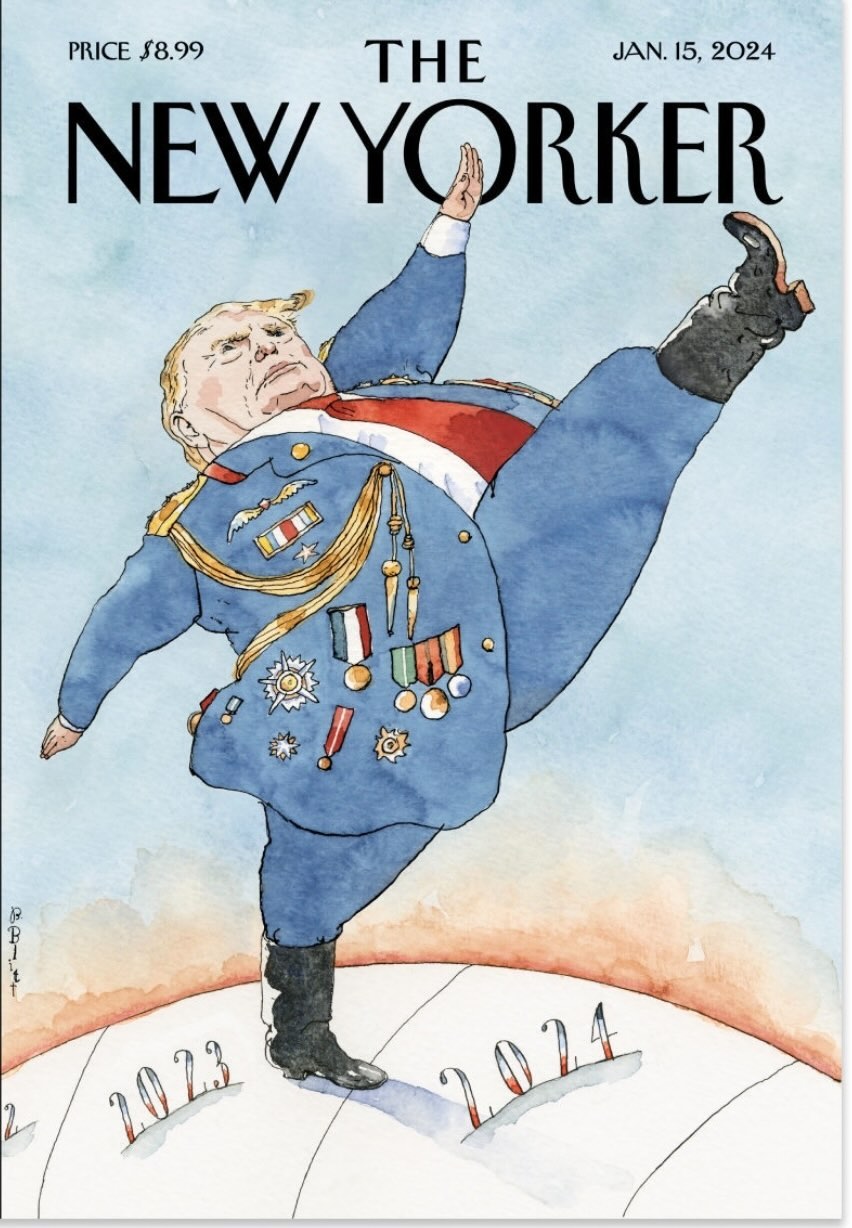
In December, Trump promised that if elected, he would be not a dictator “except for day one.“ (New Yorker cover by Barry Blitt)
“We must start urgently talking about the dangers of a second Trump presidency. With New Hampshire behind, the question isn’t who’s running but whether US democracy will endure,” media critic Margaret Sullivan wrote in January in the Guardian. Critics of excessive horse-race coverage nodded in agreement.
As the political calendar was heading toward the early primaries and last week’s Super Tuesday, the Journal-isms Roundtable grappled with the question: “Dictator on ‘Day One’: ‘How Journalists Can Counter the Growing Threat of Authoritarianism.’ ”
The consensus: By stepping up their game. Many in the media have moved in that direction, but not enough, certainly not in proportion to the stakes.
A more pointed answer: Wake up, journalists! Connect the dots and alert your readers and viewers in ways that will move them to action.
“Authoritarianism happens by slow creep, not a bomb drop, and these range from things like quashing dissent and politicizing independent institutions, all the way to stoking political violence. They don’t all happen at once, but they do reinforce and sort of build on one another in ways that make giving context really, really important,” Jennifer Dresden told the Roundtable.
Dresden is a policy advocate with Project Democracy and the primary author of “The Authoritarian Playbook: How reporters can contextualize and cover authoritarian threats as distinct from politics-as-usual.“
Others elaborated.
“The idea that could never happen in America is obviously a fallacy,” said Griff Witte, who heads the Democracy team at The Washington Post.
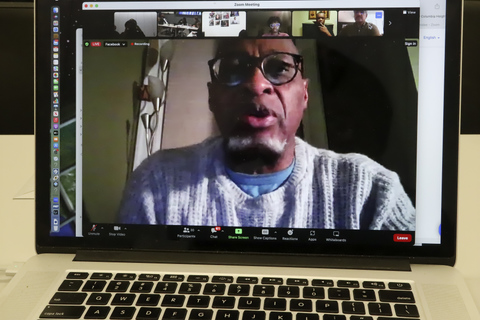 Phillip Martin, (pictured), a reporter at GBH News in Boston, wished more Americans were aware of — and took cues from — a march attended by thousands in Berlin the previous weekend against the far-right AfD party, which uses the acronym for Alternative for Germany.
Phillip Martin, (pictured), a reporter at GBH News in Boston, wished more Americans were aware of — and took cues from — a march attended by thousands in Berlin the previous weekend against the far-right AfD party, which uses the acronym for Alternative for Germany.
The march was triggered by a report exposing discussions about expelling immigrants by AfD members.
Rhetoric that sounds familiar?
“Many of these January 6 people are explicit white supremacists,” Martin continued. “That’s what January 6 was about. Some are MAGA supporters that don’t necessarily believe in white supremacy, but believe in some type of supremacy.”
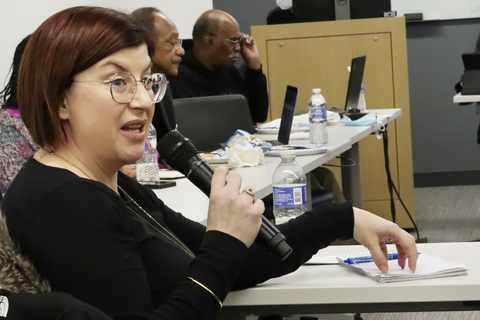 Julie Millican (pictured), vice president of Media Matters for America, said her progressive media watch group had designated the legacy media a “misinformer of the year,” declaring, in a reference to Trump, that “Nakedly authoritarian comments from the would-be president drew relatively muted coverage, while his potentially disastrous policy proposals were often ignored.”
Julie Millican (pictured), vice president of Media Matters for America, said her progressive media watch group had designated the legacy media a “misinformer of the year,” declaring, in a reference to Trump, that “Nakedly authoritarian comments from the would-be president drew relatively muted coverage, while his potentially disastrous policy proposals were often ignored.”
Millican told us, “We have seen individual reporting that has been very good.” The challenge “has been that there hasn’t been a consistency. . . . You’re not constantly kind of tying this all back to, ‘here’s what the threat is,’ ‘here’s how it’s playing out,’ ‘here’s where all these alarm bells and the authoritarianism playbook are sounding.’ “
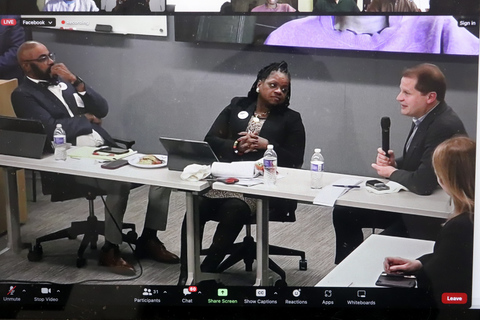
Lawyer Barbara Arnwine, president and founder of the Transformative Justice Coalition, a social justice group most recently working on restoring the gutted parts of the Voting Rights Act, outlined what she considered yet another affront to democracy: A court decision last year that said only the attorney general, not citizens, may take legal action against voter suppression.
Daryl Jones, the coalition’s board chair, told the group, “We have a resolution that we’re going to be passing around the country. It’s going to county councils, to city governments, to municipalities, and what it’s going to say is, we recognize the challenges that have been overcome by the use of the Voting Rights Act of ’65 and we are in opposition to what the Eighth Circuit has stood for.”
Fourteen state attorneys general have signed onto an amicus brief [PDF] backing the coalition’s position.
For too many in the public, though, said Arnwine and Jones, that court decision and its implications have yet to register.
Nichelle Smith, an investigative journalist formerly with USA Today, contended that on the broader subject, “the issue is getting the average white person to understand that the threat to democracy is just as much a threat to his way of life as it is to the ways of life of Black and immigrant people . . . people believe that this is just something that people of color need to worry about.”
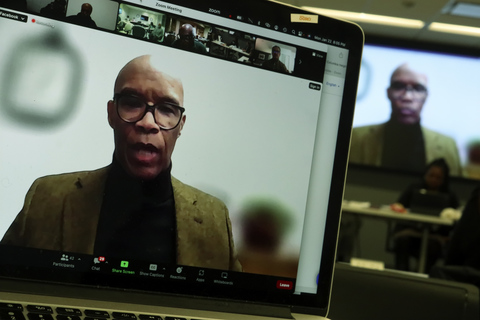 Charles Whitaker (pictured), dean of the Medill School of Journalism, Media, Integrated Marketing Communications, said, “We did a survey of Chicago area students aged 15 to 20 and found that over 70 percent of them said they do not watch any form or consume any form of news,” and that “their news diet has a very well-worn pattern of TikTok videos and things that are not necessarily related to civics and the functioning of the democracy.” Journalists should be asking, “How does one get through?” the dean said.
Charles Whitaker (pictured), dean of the Medill School of Journalism, Media, Integrated Marketing Communications, said, “We did a survey of Chicago area students aged 15 to 20 and found that over 70 percent of them said they do not watch any form or consume any form of news,” and that “their news diet has a very well-worn pattern of TikTok videos and things that are not necessarily related to civics and the functioning of the democracy.” Journalists should be asking, “How does one get through?” the dean said.
He put his finger on what might be the biggest problem of all:
“The American public is woefully ignorant about democracy and how our government functions. And we in the media tend to operate on this level that presumes that they are all understanding of concepts like democracy, authoritarianism, demagoguery, but the reality is those are really, really abstract concepts to most of the American public.
“And the people who are are absolutely familiar with and aware of those concepts we kind of already have. The other issue that we have to confront and we haven’t really talked about here is that no matter how well we attempt to connect those dots . . . . the reality is also [that] more and more the American public is avoiding news.
“They are not seeing anything. It doesn’t matter how well we do it. They are not buying what we’re selling.
“They are not consuming it. They . . . feel embattled, they don’t like the rancor in politics or they don’t think that it has a direct effect on their lives. I wonder to what extent that is not just the fact that that information is not being presented to people as much as it is also that people are completely tuning out on that information when it is presented to them.”
Another who deals with young people, Louise Dubé, CEO of iCivics, a group founded in 2009 by the late Supreme Court Justice Sandra Day O’Connor, said flatly, “I don’t think that this democracy will survive without a radical investment in civic education.”
The perspectives were all part of a Journal-isms Roundtable held Jan. 22 by Zoom and in-person, conducted at the Washington, D.C., campus of the Medill School, located in the same building as The Washington Post.
Twenty-one attended in person, with 48 on the Zoom, including Morgan State University students of E.R. Shipp, tuning in from a campus media room. Other viewers watched on Facebook. As of Sunday, 55 had seen the YouTube recording, embedded above.
Griff Witte, a former Washington Post foreign correspondent, is the democracy editor at the Post. “We stood up a Democracy team two years ago, in 2022, and I think we were among the first news organizations to do that,” he said. “The Washington Post should have had a democracy team throughout its entire existence. The Post was founded in 1877, which many of you may know was also the year that Reconstruction ended following an inconclusive presidential election.
“And what followed was 100 years of Jim Crow segregation throughout the South. That would have been a great time for The Washington Post to have a democracy team throughout the civil rights era. That would have been a great time for the Post to have a democracy team.
“Throughout the entire history of the United States, the question of who gets a say, who gets a seat at the table, whose vote matters has been in dispute. And it has been in dispute in different ways and through different means, but it remains in dispute today.
“The question of who gets a say, whose voice matters, is one that the democracy team at the Post is dedicated to covering.”
One of the team’s products is a 10-part series, “Imperfect Union,” which, in Witte’s words, “looks in detail at all of the ways in which the system of government that we have isn’t reflective of the popular will.”
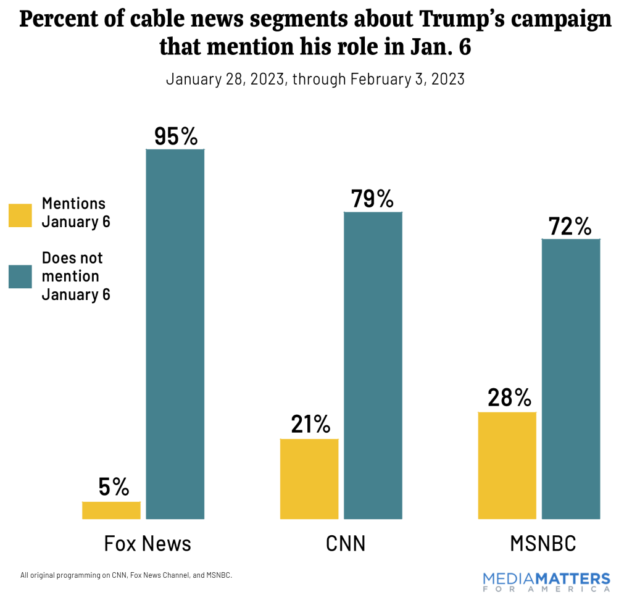
The Associated Press created its own team in early 2023, said Gary Fields, a team member.
“And some of the things we’ve been looking at are the same things that Griff was talking about, which is, you know, [you’re] looking at misinformation, disinformation and what role that’s going to play.
“You’re looking at history and you’re looking at what people say. Part of this thing is kind of easy because, hell, it’s not like anybody’s hiding . . . what’s going on here. People come out and openly say it and take open actions. You have open actions. You have open gerrymandering.
“Nobody’s hiding the fact that they’re trying to actually control seats and control Congress. Nobody hides the fact that there’s disenfranchisement.
“Or in a place like for instance Georgia, where they were changing some of the rules on what you can actually do in terms of going out to cast a ballot, that you couldn’t have water you couldn’t have these various things.
“So it’s not like anybody’s actually doing this in a subtle way. So then it just becomes a matter of getting out there and getting off your behind and just going to cover the stories.”
Roundtable attendees saw this two-minute video clip from Eddie Glaude, author, public intellectual and James S. McDonnell Distinguished University Professor of African American Studies at Princeton University. Donald Trump supporters are “reaching for languages of order as an economic system collapses,” Glaude said. “You do have this kind of sense of history that is leading people to reach for strongmen to get them a sense of order.”
An example of the AP team’s coverage: “As social media guardrails fade and AI deepfakes go mainstream, experts warn of impact on elections.”
Public media is stepping up as well, noted Julie Drizin, executive director of Current, which reports on public television and radio.
Leigh Giangreco reported for Current in January 2022 on the democracy-coverage efforts of several local stations, such as KPCC in Pasadena, Calif., which created a democracy beat.
The “new role is part of the station’s commitment to cover the ‘Big Lie’ locally in an effort to make the existential threat to democracy relevant to its audience,” Giangreco reported. “KPCC CCO Kristen Muller described those plans in a Nieman Lab ‘prediction,’ outlining the need for voter registration guides for school board elections, lists of lawmakers who supported Trump’s false claims and detailed explainers on how votes are counted.”
Drizin added that WITF in Harrisburg, Pa., “has an unusual approach of identifying legislators’ connections to January 6 in every story:
“In online articles, WITF includes a breakout box that details elected officials’ connections to the insurrection and explains their participation. After a radio story including such a lawmaker ends, a host reads a tagline.”
Witte echoed Bailon’s message about positivity, and gave an example.
“It is important to remember that there are things that are happening that are positive and that people, when they engage, actually are capable of moving the system and changing things,” Witte said.
“And so that ‘Imperfect Union’ project that I mentioned earlier, a lot of it was focused on the problems with our democracy.
“But we really made a point of profiling people who had engaged with their democracy and who had improved the system and who had changed things.
“And that included young people. So, you know, we wrote about a young woman in Michigan who was very disturbed by the gerrymandering that she saw in Congress, in her state legislature.
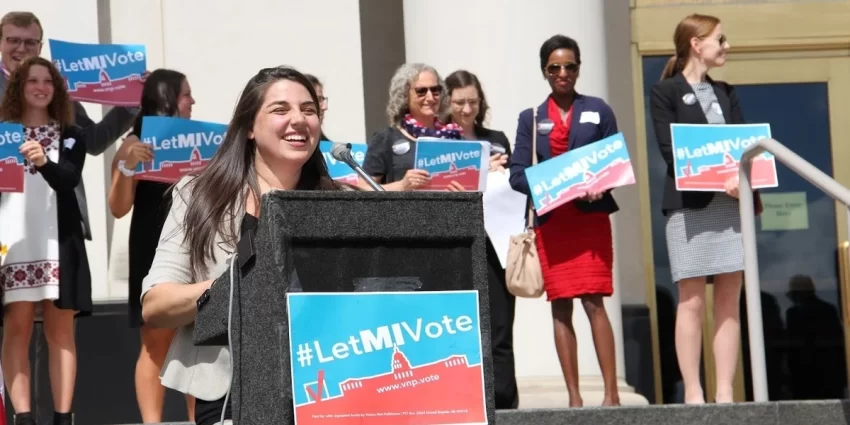
“She got on Facebook and she said, who wants to help me on gerrymandering? You know she didn’t expect anyone to answer because, who was she? She was just a young person who had no formal role in politics whatsoever, no experience in politics whatsoever, no experience in politics.
“But it just so happened that 1,000 people answered and said, ‘me, I want to do it.’
“And the first thing she did after that was Google, ‘How do I end gerrymandering?’ And she was able from that, just sort of throwing an idea out there to start a movement that actually did change how congressional districts and legislative districts are drawn in Michigan. And it took it out of the hands of politicians who are always going to draw districts to favor themselves and put it in the hands of citizens.
“And so, you know, it is important. It’s not Pollyannish to focus on the positive when it does exist. . . . It’s a reminder that there is nothing that’s predetermined about the direction that our democracy is headed in, that there are ways that regular citizens can engage and can change things.”
- Jenice Armstrong, Philadelphia Inquirer: Support for Trump has spiked among Black voters. Why? I asked some to find out.
- Michael Bugeja, Poynter Institute: How will the news media cover autocracy if Trump wins in 2024? (Dec. 12)
- Marc Elias, Democracy Docket: Donald Trump’s Plot Against America (Dec. 6)
- Renée Graham, Boston Globe: Michelle Obama is not coming to save us: The upcoming election is less a popularity contest between two old men than a battle between two warring political ideologies — democracy and authoritarianism.
- Emil Guillermo, Asian American Legal Defense and Education Fund: Biden shows he’s ready for the fight
- Journal-isms: Was U.S. Ever a Democracy for People of Color? (Sept. 30, 2022)
- Rachel Maddow, X: By popular (and 2AliVelshi) demand, here is the thesis portion of last night’s Rachel Maddow A block: Why does Trump keep talking like a fascist? Because it works. (Dec. 19)
- Clarence Page, Chicago Tribune: Donald Trump’s bizarre pitch to Black voters is martyrdom marketing
- Greg Sargent, New Republic: Maddening New Poll: Voters Are Unaware of Trump “Dictator” Threats
- Kimberly Atkins Stohr, Boston Globe: Public criticism of political news coverage cries out for the return of the public editor (Feb. 28)
- Chinta Strausberg, Chicago Crusader: Attorney Arnwine warns of paid Hip-Hop artists promoting Trump (Jan. 22)
‘[btnsx id=”5768″]
To subscribe at no cost, please send an email to journal-isms+subscribe@groups.io and say who you are.
Facebook users: “Like” “Richard Prince’s Journal-isms” on Facebook.
Follow Richard Prince on Twitter @princeeditor
Richard Prince’s Journal-isms originates from Washington. It began in print before most of us knew what the internet was, and it would like to be referred to as a “column.” Any views expressed in the column are those of the person or organization quoted and not those of any other entity. Send tips, comments and concerns to Richard Prince at journal-isms+owner@
View previous columns (after Feb. 13, 2016).
View previous columns (before Feb. 13, 2016)
- Diversity’s Greatest Hits, 2018 (Jan. 4, 2019)
- Book Notes: Is Taking a Knee Really All That? (Dec. 20, 2018)
- Book Notes: Challenging ’45’ and Proudly Telling the Story (Dec. 18, 2018)
- Book Notes: Get Down With the Legends! (Dec. 11, 2018)
- Journalist Richard Prince w/Joe Madison (Sirius XM, April 18, 2018) (podcast)
- Richard Prince (journalist) (Wikipedia entry)
- February 2018 Podcast: Richard “Dick” Prince on the need for newsroom diversity (Gabriel Greschler, Student Press Law Center, Feb. 26, 2018)
- Diversity’s Greatest Hits, 2017 — Where Will They Take Us in the Year Ahead?
- Book Notes: Best Sellers, Uncovered Treasures, Overlooked History (Dec. 19, 2017)
- An advocate for diversity in the media is still pressing for representation, (Courtland Milloy, Washington Post, Nov. 28, 2017)
- Morgan Global Journalism Review: Journal-isms Journeys On (Aug. 31, 2017)
- Diversity’s Greatest Hits, 2016
- Book Notes: 16 Writers Dish About ‘Chelle,’ the First Lady
- Book Notes: From Coretta to Barack, and in Search of the Godfather
- Journal-isms’ Richard Prince Wants Your Ideas (FishbowlDC, Feb. 26, 2016)
- “JOURNAL-ISMS” IS LATEST TO BEAR BRUNT OF INDUSTRY’S ECONOMIC WOES (Feb. 19, 2016)
- Richard Prince with Charlayne Hunter-Gault, “PBS NewsHour,” “What stagnant diversity means for America’s newsrooms” (Dec. 15, 2015)
- Book Notes: Journalists Follow Their Passions
- Book Notes: Journalists Who Rocked Their World
- Book Notes: Hands Up! Read This!
- Book Notes: New Cosby Bio Looks Like a Best-Seller
- Journo-diversity advocate turns attention to Ezra Klein project (Erik Wemple, Washington Post, March 5, 2014)
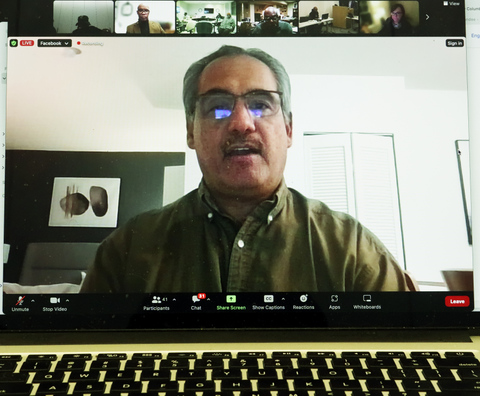
Gilbert Bailon, veteran journalist now executive editor of public station WBEZ in Chicago, was joining the Roundtable on his birthday, and the attendees sang the Stevie Wonder version of “Happy Birthday.”
WBEZ, the Chicago Sun-Times and the University of Chicago are part of a year-long Democracy Solutions Project. It “examines the current threats to our democracy, including barriers to voting, cynicism, misinformation, polarization and much more,” according to the project’s website. That includes Illinois’ history of corruption in state government, Bailon said.
“We offer solutions for voters. So in this, we have multiple different things. Some of it would be more traditional news coverage.
“Features, guides, explainers, conversations, editorials. And stories that present solutions for people.” In the spring, “We’re going to have three different trips to different international sites. One in Colombia, looking at immigration, and one in Canada, looking at immigration also, and one in Australia, where we’ll be looking at compulsory voting there; looking at how [are] these issues tackled elsewhere around the world.
“As you know, migrants have been bussed to Chicago.
“Immigration is a big issue.
“We’re looking at how does it look like when you’re in Colombia, where you’re right next to Venezuela and you have people coming in.
“Have they found solutions for that? It’s also very engaging. We’ve done a survey already.
“We’ve had more than 1,500 answers from people [when we asked,] what do they want to know about? What are their concerns?
“We’re with this at the University of Chicago. We’re convening a group of what we’re calling salons.”
Believing that the threats to democracy must be addressed in the schools, Louise Dubé is carrying on the work of Justice O’Connor in bringing the issue to the classroom.
“We need to have a check and balance on the processes that you guys have all incredibly well described and the schools of our country, K-12 schools, are one leverage point to do that,” she said.
“So as Dean Whitaker mentioned, students are not graduating with the proper training and we have not only instructional materials, professional development, but we also have a six- person policy team that is seeking to make a change at the federal level to get a radically higher investment in civic education as well as 40 states — coalitions in 40 states to try to pass legislation to get more civic and better civic education.”
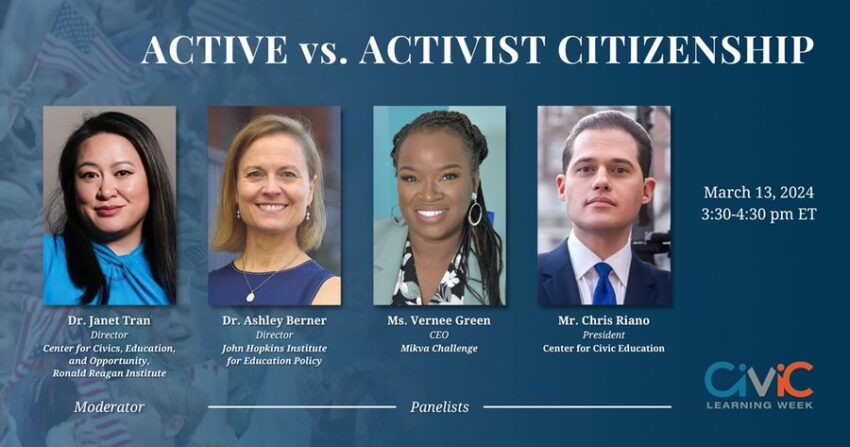
Moreover, iCivic and like-minded groups have designated this week, March 11-15, as Civic Learning Week, where “We will discuss stories of progress on policy in civic education, but also in communities where there have been deep divisions about the nature of civics and the community was able to move forward.”
Witte echoed Bailon’s message about positivity, and gave an example.
“It is important to remember that there are things that are happening that are positive and that people, when they engage, actually are capable of moving the system and changing things,” Witte said.
“And so that ‘Imperfect Union’ project that I mentioned earlier, a lot of it was focused on the problems with our democracy.
“But we really made a point of profiling people who had engaged with their democracy and who had improved the system and who had changed things.
“And that included young people. So, you know, we wrote about a young woman in Michigan who was very disturbed by the gerrymandering that she saw in Congress, in her state legislature.

“She got on Facebook and she said, who wants to help me on gerrymandering? You know she didn’t expect anyone to answer because, who was she? She was just a young person who had no formal role in politics whatsoever, no experience in politics whatsoever, no experience in politics.
“But it just so happened that 1,000 people answered and said, ‘me, I want to do it.’
“And the first thing she did after that was Google, ‘How do I end gerrymandering?’ And she was able from that, just sort of throwing an idea out there to start a movement that actually did change how congressional districts and legislative districts are drawn in Michigan. And it took it out of the hands of politicians who are always going to draw districts to favor themselves and put it in the hands of citizens.
“And so, you know, it is important. It’s not Pollyannish to focus on the positive when it does exist. . . . It’s a reminder that there is nothing that’s predetermined about the direction that our democracy is headed in, that there are ways that regular citizens can engage and can change things.”
- Jenice Armstrong, Philadelphia Inquirer: Support for Trump has spiked among Black voters. Why? I asked some to find out.
- Michael Bugeja, Poynter Institute: How will the news media cover autocracy if Trump wins in 2024? (Dec. 12)
- Marc Elias, Democracy Docket: Donald Trump’s Plot Against America (Dec. 6)
- Renée Graham, Boston Globe: Michelle Obama is not coming to save us: The upcoming election is less a popularity contest between two old men than a battle between two warring political ideologies — democracy and authoritarianism.
- Emil Guillermo, Asian American Legal Defense and Education Fund: Biden shows he’s ready for the fight
- Journal-isms: Was U.S. Ever a Democracy for People of Color? (Sept. 30, 2022)
- Rachel Maddow, X: By popular (and 2AliVelshi) demand, here is the thesis portion of last night’s Rachel Maddow A block: Why does Trump keep talking like a fascist? Because it works. (Dec. 19)
- Clarence Page, Chicago Tribune: Donald Trump’s bizarre pitch to Black voters is martyrdom marketing
- Greg Sargent, New Republic: Maddening New Poll: Voters Are Unaware of Trump “Dictator” Threats
- Kimberly Atkins Stohr, Boston Globe: Public criticism of political news coverage cries out for the return of the public editor (Feb. 28)
- Chinta Strausberg, Chicago Crusader: Attorney Arnwine warns of paid Hip-Hop artists promoting Trump (Jan. 22)
‘[btnsx id=”5768″]
To subscribe at no cost, please send an email to journal-isms+subscribe@groups.io and say who you are.
Facebook users: “Like” “Richard Prince’s Journal-isms” on Facebook.
Follow Richard Prince on Twitter @princeeditor
Richard Prince’s Journal-isms originates from Washington. It began in print before most of us knew what the internet was, and it would like to be referred to as a “column.” Any views expressed in the column are those of the person or organization quoted and not those of any other entity. Send tips, comments and concerns to Richard Prince at journal-isms+owner@
View previous columns (after Feb. 13, 2016).
View previous columns (before Feb. 13, 2016)
- Diversity’s Greatest Hits, 2018 (Jan. 4, 2019)
- Book Notes: Is Taking a Knee Really All That? (Dec. 20, 2018)
- Book Notes: Challenging ’45’ and Proudly Telling the Story (Dec. 18, 2018)
- Book Notes: Get Down With the Legends! (Dec. 11, 2018)
- Journalist Richard Prince w/Joe Madison (Sirius XM, April 18, 2018) (podcast)
- Richard Prince (journalist) (Wikipedia entry)
- February 2018 Podcast: Richard “Dick” Prince on the need for newsroom diversity (Gabriel Greschler, Student Press Law Center, Feb. 26, 2018)
- Diversity’s Greatest Hits, 2017 — Where Will They Take Us in the Year Ahead?
- Book Notes: Best Sellers, Uncovered Treasures, Overlooked History (Dec. 19, 2017)
- An advocate for diversity in the media is still pressing for representation, (Courtland Milloy, Washington Post, Nov. 28, 2017)
- Morgan Global Journalism Review: Journal-isms Journeys On (Aug. 31, 2017)
- Diversity’s Greatest Hits, 2016
- Book Notes: 16 Writers Dish About ‘Chelle,’ the First Lady
- Book Notes: From Coretta to Barack, and in Search of the Godfather
- Journal-isms’ Richard Prince Wants Your Ideas (FishbowlDC, Feb. 26, 2016)
- “JOURNAL-ISMS” IS LATEST TO BEAR BRUNT OF INDUSTRY’S ECONOMIC WOES (Feb. 19, 2016)
- Richard Prince with Charlayne Hunter-Gault, “PBS NewsHour,” “What stagnant diversity means for America’s newsrooms” (Dec. 15, 2015)
- Book Notes: Journalists Follow Their Passions
- Book Notes: Journalists Who Rocked Their World
- Book Notes: Hands Up! Read This!
- Book Notes: New Cosby Bio Looks Like a Best-Seller
- Journo-diversity advocate turns attention to Ezra Klein project (Erik Wemple, Washington Post, March 5, 2014)

2 comments